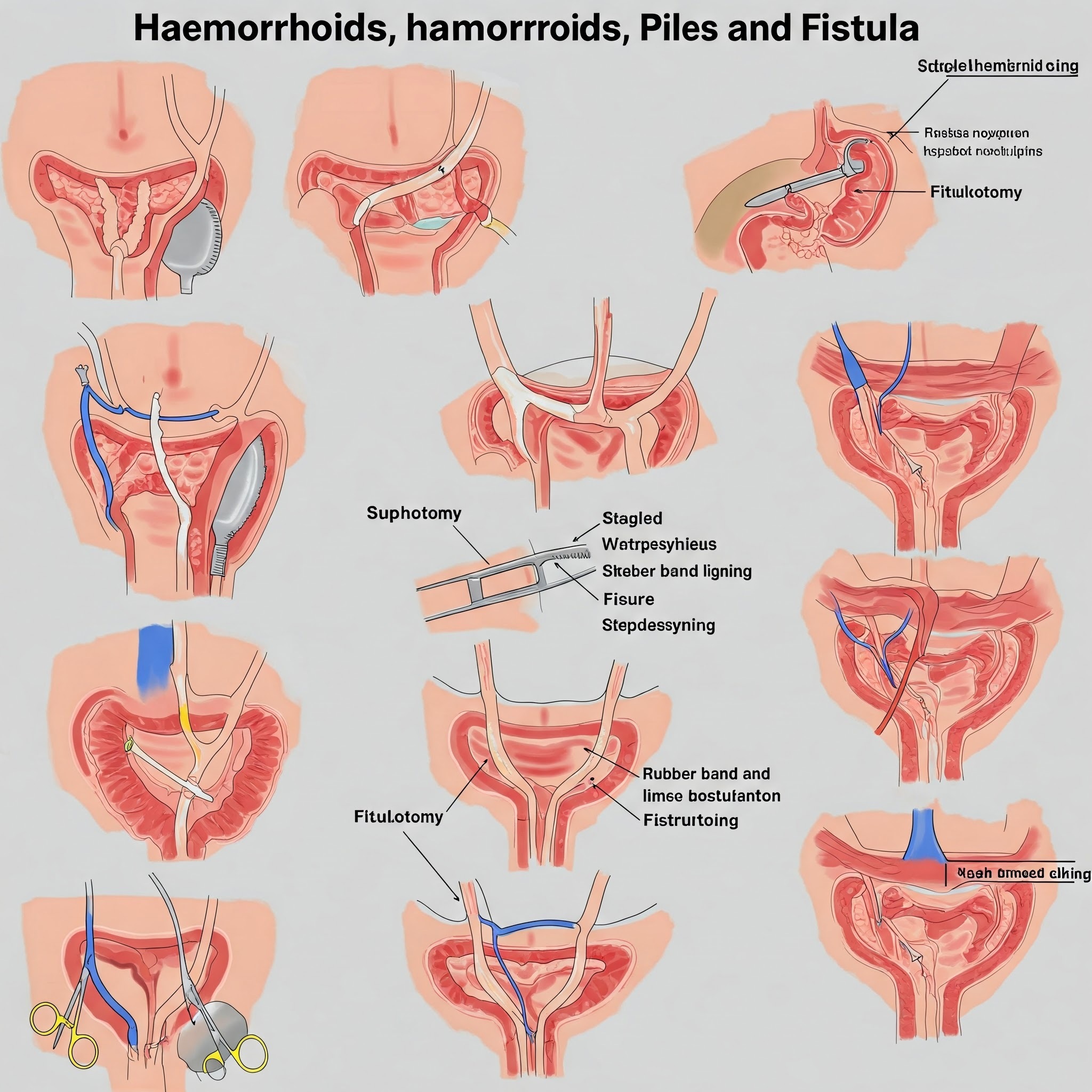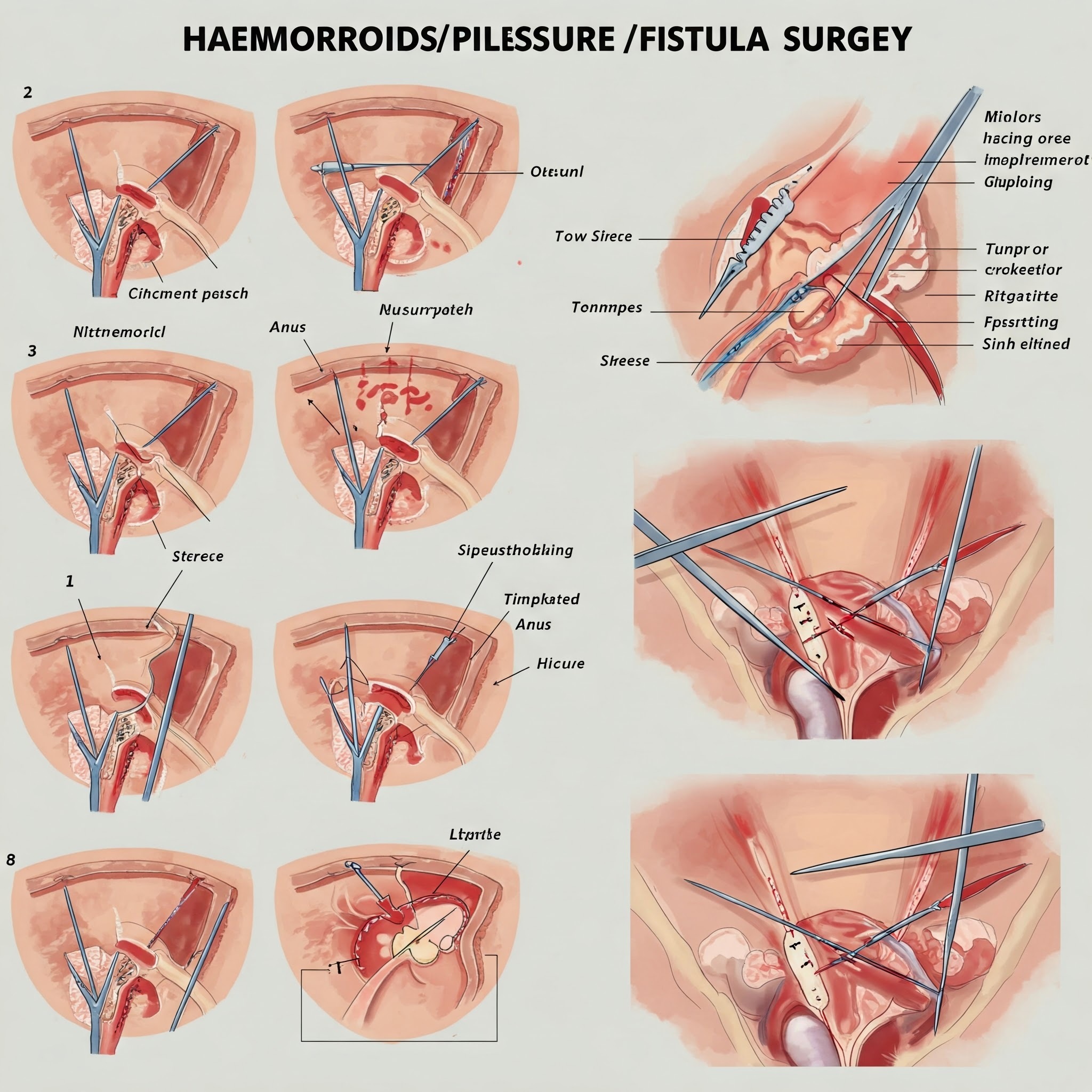Haemorrhoids/Piles/Fissure/Fistula Surgery
Comprehensive care for haemorrhoids, piles, fissure, and fistula surgery
Relief and recovery with advanced surgical solutions
At neo-woman, we offer expert care for haemorrhoids, piles, fissures, and fistulas through advanced, minimally invasive surgical techniques. Our experienced surgeons use state-of-the-art diagnostic tools to accurately assess your condition and recommend the most effective treatment plan.
Haemorrhoids, commonly known as piles, can cause discomfort, itching, and bleeding. Fissures, small tears in the anal lining, often result in severe pain during bowel movements. Fistulas, abnormal connections between tissues, require timely medical intervention to prevent complications. Our specialized team provides tailored solutions for these conditions, ensuring patient comfort and speedy recovery.
Our surgical procedures prioritize minimal discomfort, faster recovery, and long-term relief. From laser treatments to conventional surgery, we adopt the most suitable approach based on the patient’s condition. With personalized care and compassionate support, Neo-Woman ensures a smooth journey to better health and well-being.


Haemorrhoids, piles, fissure, and fistula surgery: advanced treatment for lasting relief
We provide expert care for haemorrhoids, piles, fissures, and fistulas using modern surgical techniques. Our procedures are designed to alleviate discomfort, reduce recovery time, and improve quality of life. From minimally invasive interventions to advanced surgeries, our team offers compassionate and effective treatment options tailored to individual needs.
- Recognizing the symptoms of haemorrhoids and when to seek help
Haemorrhoids, commonly known as piles, are swollen veins in the lower rectum and anus, often resulting from prolonged straining during bowel movements, pregnancy, or chronic constipation. The symptoms can vary based on the type and severity of haemorrhoids. Common signs include rectal bleeding, itching, pain, and swelling around the anus. Internal haemorrhoids may cause painless bleeding, while external ones can result in significant discomfort. Early diagnosis and intervention can prevent complications like thrombosis or prolapse. If you notice persistent discomfort or bleeding, seeking medical advice is essential. Neo-Woman’s Haemorrhoid Surgery Clinic offers expert evaluation and advanced treatment options to alleviate symptoms and improve quality of life.
Here are some of the check up and health screenings that you should get done:
- Pelvic Exam
- Pap Smear (Cervical Cancer Screening)
- Breast Exam
- Blood Pressure Measurement
- Cholesterol Screening
- Bone Density Scan (DXA)
- Blood Sugar Test (Glucose Screening)
- Thyroid Function Tests
- Blood Count (Complete Blood Count, CBC)
* The specific exams and screenings recommended can vary based on a woman’s age, family history, personal health history, and risk factors. It’s essential to discuss your individual healthcare needs and screening schedule with your healthcare provider.
- Minimally invasive options for piles treatment
Gone are the days when piles treatment required extensive surgical procedures and lengthy recovery times. Minimally invasive techniques like rubber band ligation, sclerotherapy, and laser haemorrhoidoplasty provide effective relief with minimal discomfort and quicker recovery. Laparoscopic and laser-based procedures reduce the risk of complications, offering a safe alternative to traditional surgery. At Neo-Woman, our specialists evaluate each case to recommend the most suitable treatment plan, ensuring personalized care and optimal outcomes. These techniques allow patients to return to normal activities sooner, minimizing disruption to daily life.
- The difference between fissures and fistulas: symptoms and care
Anal fissures and fistulas are common anorectal conditions often mistaken for one another due to similar symptoms. Fissures are small tears in the anal lining, causing sharp pain, especially during bowel movements, along with itching and minor bleeding. Fistulas, on the other hand, are abnormal tunnels connecting the anal canal to the skin surface, often resulting from untreated abscesses. Symptoms include persistent pain, swelling, and discharge. Proper diagnosis through physical examination and imaging is crucial for effective treatment. Neo-Woman’s surgical team employs advanced techniques to address both conditions, ensuring lasting relief and preventing recurrence.
- Post-surgery care for haemorrhoids: recovery tips for long-term relief
Proper post-operative care plays a critical role in ensuring successful recovery after haemorrhoid surgery. Patients may experience mild discomfort, swelling, or bleeding during the initial days. Following medical advice regarding pain management, diet, and hygiene is essential. A high-fiber diet, adequate hydration, and regular use of prescribed medications can aid recovery. Sitz baths, taken several times daily, help alleviate pain and promote healing. Avoiding heavy lifting and strenuous activities during the recovery period also minimizes complications. At Neo-Woman, our healthcare professionals provide detailed aftercare instructions and support to facilitate a smooth and efficient recovery process.
- Preventing recurrence: lifestyle changes after anorectal surgery
Haemorrhoids, fissures, and fistulas can recur if underlying causes are not addressed. Preventive measures like maintaining a fiber-rich diet, staying hydrated, and practicing good bathroom habits are essential. Regular physical activity helps reduce pressure on anal veins, preventing haemorrhoids from returning. Avoid prolonged sitting or straining during bowel movements, as these habits contribute to anorectal issues. Neo-Woman’s medical team not only provides expert surgical care but also guides patients on long-term lifestyle adjustments to maintain digestive and anorectal health, ensuring a better quality of life post-surgery.

Frequently asked questions
What are haemorrhoids, and when is surgery needed?
Haemorrhoids are swollen veins in the rectum. Surgery is recommended for persistent pain or bleeding.
What surgical options are available?
Options include hemorrhoidectomy, stapled hemorrhoidopexy, or minimally invasive techniques like laser surgery.
Is recovery from haemorrhoid surgery painful?
Pain is common initially but can be managed with medications and sitz baths.
What can I do to prevent recurrence?
Maintain a high-fiber diet, stay hydrated, and avoid prolonged sitting.
How soon can I return to normal activities?
Most patients resume light activities within a week and fully recover in a few weeks.
Disclaimer: Results and patient experiences may vary. These are dependent on a number of factors including age, medical history, lifestyle and more.

Service line
Our locations
Neo-woman clinic
Apte Road
1212, Apte Rd, opp. Centro Hotel, Shirole Road, Shivajinagar, Pune, Maharashtra 411004
Contact us at: 9423039292
Our locations
Neo-woman clinic
Hadapsar
Gandharva Empire, 3rd floor, Above Fab India, Raskar Chowk, Amanora Park, Hadapsar, Pune, Maharashtra 411036
Contact us at: 7030114488
Copyright © 2026 neo-Woman – all rights reserved.
:::| powered by dimakh consultants |:::